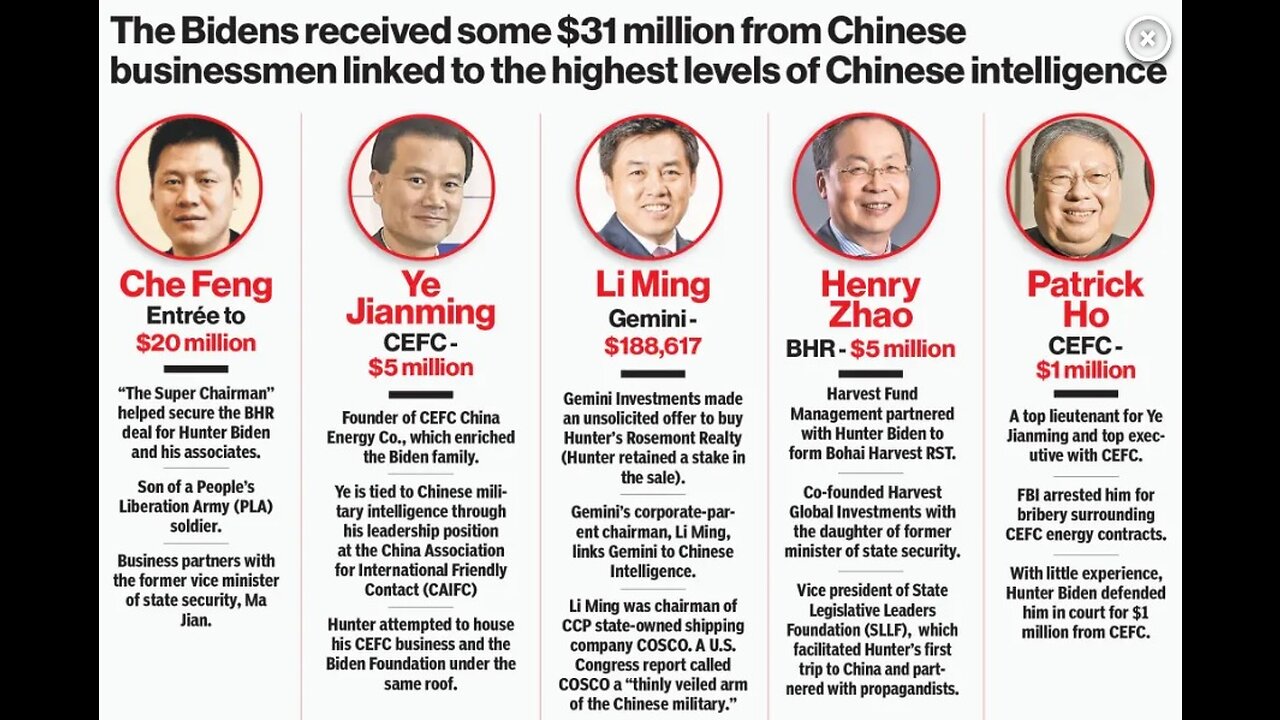Premium Only Content

Fireworks Make America Great Again China & Russia Paid U.S. Politicians 9.6+ Billions
Exclusive 1,676 U.S. Groups Linked to Chinese and Russia Communist Party and Other Countries Have Paid Out Over 9.6 Billion Dollars So Far To Influence Effort with Ambition Beyond Election Chinese Elite have paid some $31 million to Hunter and the 9 Biden's Family Members For those wondering why Joe Biden is soft on China, consider this never-before-reported revelation: The Biden family has done five deals in China totaling some $31 million arranged by individuals with direct ties to Chinese intelligence — some reaching the very top of China’s spy agency.
How Did Members of Congress Get So Wealthy?
The highest net worth on Capitol Hill is nearly $360 million—and that’s before you even get to the Rockefeller heir. Congress is rich. How rich? On Monday, Roll Call released its annual analysis of financial-disclosure forms, identifying the 50 richest members of Congress, and this isn’t an easy club to get into—it takes a minimum net worth of $7.4 million to crack this year’s list. So who has the most Benjamins? Darrell, Nancy, or Mitch? Here’s what the list tells us about our legislators.
Members of Congress are way wealthier than average Americans.
For the second year in a row, Representative Darrell Issa tops the lot with a net worth of $357.25 million, largely the result of his spectacular success at manufacturing car alarms. Issa’s wealth is triple that of second-placed Michael McCaul ($117.54 million). House Minority Leader Nancy Pelosi placed third ($74.11 million), while Senate Minority Leader Mitch McConnell, with net assets totaling $11.97 million, slots in at number 32. In 2012, the Center for Responsive Politics found that the median congressman was worth more than one million dollars. In an era when it costs an average of more than $10 million to win a seat, it’s no surprise that the wealthy and well-connected would be overrepresented. Nor is congressional wealth a new phenomenon.
But the number of multimillionaires in the Capitol, along with the well-documented rise of income inequality in recent decades, contribute to the perception that politicians are out of touch with average Americans’ needs. The GOP candidate for Senator in Georgia, former Dollar General CEO David Perdue, was accused by a primary opponent’s campaign manager of failing to understand “this is an election, not an auction.” In Kentucky, Senate candidate Alison Lundergan Grimes has criticized Mitch McConnell for quadrupling “his net worth on the backs of Kentuckians that can’t afford it.”
Presidential candidates face the same hurdles. Mitt Romney spent much of the 2012 campaign fending off attacks, fueled by comments like “my wife drives a couple of Cadillacs,” on his massive personal wealth, while Hillary Clinton has questionably claimed that she and Bill were “dead broke” upon leaving the White House. They get their money from all over the place.
Darrell Issa made his money through managing his company, but he has since moved most of his wealth into the bond market. Others, like Senator Jay Rockefeller and Representative Joseph Kennedy III, are heirs to significant family fortunes. California Representative Gary Miller’s real-estate portfolio accounts for 94 percent of his wealth. McCaul’s wealth is entirely connected to his wife’s family fortune—he does not have a single asset listed in his name in his financial disclosure. Senators John McCain and Claire McCaskill also draw more than 94 percent of their wealth from spouse-owned assets. Congressional wealth comes from many different places, but one thing links it together: These lawmakers, unlike most of their constituents, do not draw the bulk of their income from a paycheck. In 2010, more than 150 lawmakers reported earning more from outside investments than from the congressional salary, which for a rank-and-file House or Senate member is $174,000. (In 2012, the median U.S. household income was $51,017, and the median household net worth was $56,335.) That discrepancy between the public and lawmakers may distort the congressional debate on topics like the capital-gains tax and the mortgage-interest deduction, which affect members more than they do most of their constituents.
It’s a bipartisan, mostly male, and heavily white bunch.
Some members of Congress have attempted to address the gender pay gap, or the fact that, according to Pew Research Center, women earn 84 percent as much as their male counterparts. In Congress’s rich club, men and women are represented proportionately, as women make up nine of the top 50—similar to the 18.8 percent of Congress they comprise, a record high.
Of the top 50, 20 are Democrats and 30 are Republicans, although Democrats occupy spots three through 11. (Sometimes portrayed as the party of the rich, Republicans actually represent districts with less income inequality than do Democrats, largely because Democrats do better in urban areas.) If the party breakdown is relatively even, the race breakdown is anything but. This Congress, the most diverse in history, is 82 percent white. All of the 50 wealthiest lawmakers are white. Unfortunately, even in a club of top earners like this, one might expect elected black men and women to lag behind whites: For every dollar owned by a white household in the U.S., black households own around a nickel.
Americans may not have much faith in their representatives, but you can say this for them: The people Americans elect are pretty good at choosing what to do with their own money. Investments range from the mundane (Johnny Isakson, Bank of America) to the trendy (Jared Polis, Uber) to the wacky (Alan Grayson, memorabilia authentication). Who will top next year’s list? It’s too soon to tell, but Darrell Issa has a commanding lead. And as any member can tell you, incumbency is a powerful advantage.
Indeed, every known deal that the Biden family enjoyed with Beijing was reached courtesy of individuals with spy ties. And Joe Biden personally benefited from his family’s foreign deals.
What are these deals? And who are the individuals who made them happen for the Bidens?
Here, then, are a few key facts about the Biden family’s $5 million-plus deals with individuals in bed with Chinese intelligence.
DEAL #1: BOHAI HARVEST RST
Payout: estimated $20 million
In 2018, I was the first to report on Hunter Biden’s involvement with a Chinese investment fund called Bohai Harvest RST (BHR). Hunter even introduced his dad to a company executive in December 2013 when father and son flew to Beijing on Air Force Two.
In October 2019, Hunter Biden’s lawyer George Mesires said Hunter would be resigning from the BHR board, without receiving any return on his investment or shareholder distributions.
What Team Biden failed to address was the fact that Hunter Biden still owned a stake in the investment fund, said to be 10%.
When I first reported on Hunter Biden’s China ties in 2018, Team Biden denied that they existed. Then they absurdly claimed that his stake in the BHR investment fund was only $420,000. Steven Kaplan, who conducts research on issues in private equity, venture capital, entrepreneurial finance, corporate governance and corporate finance at the University of Chicago Booth School of Business, said a private equity fund with $2 billion under management will typically generate fees over its life of hundreds of millions of dollars.
“It is difficult to imagine, if not incomprehensible, that a 10% stake in those economics is worth only $420K,” Kaplan said via email. “The distinction they appear to be making is they capitalized the management company with $4.2M even if the fund manages $2B. The value of that management company is likely far in excess of $4.2M if they are managing $2B.” Kaplan pointed to two large publicly traded private equity firms for reference, both of which have a market value of about 10% of the assets under their management. Using that as a rough guide, that would put the value of Hunter Biden’s share closer to $20 million, he said.
Two months ago, Hunter Biden’s lawyer said he sold his equity stake. They have not disclosed how much he made.
But courtesy of the Hunter Biden emails on his abandoned laptop, we now know two of the key individuals who made that deal happen. And at the time, they had close ties to the very top of the Chinese intelligence apparatus. A Chinese tycoon named Che Feng, a k a “The Super Chairman,” played a key role in getting the deal going by introducing Hunter and his partners to large Chinese state-backed investment funds. Hunter saw a big payday. As he wrote in one email to business partner Devon Archer, “I don’t believe in lottery tickets anymore, but I do believe in the super chairman … I think the sky’s the limit.”
Who exactly is Che Feng? At one time, he was business partners with the then-vice minister for state security in China, which is China’s KGB.
This man was reportedly the director of the ministry’s No. 8 Bureau, which targeted foreigners with its intelligence apparatus — including reporters, diplomats and businessmen. It was also reported that he oversaw intelligence operations for North America.
Another key figure in putting this investment deal together was Zhao Xuejun (a k a Henry Zhao) of Harvest Fund Management. Zhao is a Communist Party official. (“The mission of our Party is to bring happiness to people, and to revive the nation for people,” he has said.)
But more troubling — Zhao was at that time business partners with Jia Liqing, the daughter of the former minister of state security, Jia Chunwang.
In short, he was in charge of espionage, domestic and overseas intelligence work for China. Jia was famous during his tenure for developing China’s “deep water fish” (Chendi yü) strategy of developing thousands of special agents on foreign soil.
Zhao was also a key figure for Biden prospects in China. His fund participated in BHR, where Hunter Biden received a board seat. The business that he co-founded with Jia Liqing, Harvest Global Investments, also figures in Deal #2.
DEAL #2: BURNHAM ASSET MANAGEMENT
Payout: $5 million
Hunter Biden had another company called Burnham Asset Management. According to court documents filed by disgruntled investors, Harvest Global wired Burnham $5 million.
The purpose of this payment is unclear, but it may have been intended as an investment in Hunter’s business.
According to emails obtained from Hunter Biden’s laptop, Zhao may have sent other money, too.
“Henry remains committed to also making something work with myself and Hunter outside of this Burnham matter as mentioned before,” business partner James Bulger wrote. “He has a few interesting ideas.”
Zhao had suggested to Hunter and his business partners that he would structure a deal they estimated would be “putting money directly into our pockets.”
DEAL #3: HUNTER TEAMS UP WITH CHINA’S ‘DRAGON HEAD’
Payout: $188,000+
Hunter Biden had co-founded a firm called Rosemont Realty, and as early as 2011, he was looking for a Chinese buyer.
Rosemont Realty owns commercial buildings around the United States.
He had little luck initially, but then he and his partners received an “unsolicited offer” from a Hong Kong-based firm called Gemini Investments to buy his firm.
What is Gemini? The company is controlled by something then called Sino-Ocean Land, which was also chaired by the head of China Ocean Shipping Corporation (COSCO). Japanese government agencies report that “Chinese intelligence services are closely linked” to COSCO. Some scholars in the West refer to COSCO as the “fifth arm of the Chinese Navy.”
For his part, President Xi Jinping has called the company “the dragon’s head for China” because of its strategic activities in Europe.
Hunter worked even more closely with COSCO in an attempt to buy the Greek national railway.
How much has Hunter Biden made from the Chinese deal that took over Rosemont Realty? It is impossible to know. But emails reveal at least one payment of approximately $188,000 from Rosemont Realty to Hunter Biden.
He also retained his stake in the company after the Chinese leadership took over.
DEAL #4: CEFC CHINA ENERGY
Payout: $6 million
Ye Jianming, a wealthy Chinese businessman and the head of CEFC China Energy, provided $6 million to the Biden family, according to a Senate investigation into Hunter’s activities.
In early 2017, one month after his father left office as vice president, Hunter Biden worked for Ye as a counselor and adviser, and Joe Biden’s brother James received some of the funds that Ye transferred to Hunter. Five million came in the form of a forgivable, interest-free loan. Ethically, a loan is worse than a cash gift for a politician’s family, because the loan giver can always demand their money back if the recipient of the funds is not doing as they like.
Who exactly is Ye?
Ye Jianming once served in a leadership position within the China Association for International Friendly Contact (CAIFC), which is funded directly by Chinese military intelligence.
CEFC’s corporate documents confirm its self-perceived role in advancing China’s national energy strategy. Ye Jianming’s close relationship with both the Chinese military intelligence apparatus and the government cannot be overstated.
DEAL #5: CEFC’s PATRICK HO
Payout: $1 million
Hunter Biden received even more money in his relationship with CEFC and Ye Jianming.
In 2017, one of Ye Jianming’s “top lieutenants,” Patrick Ho, was arrested on bribery charges by the FBI for offering money to African officials in exchange for energy deals.
He immediately called James Biden, Joe Biden’s brother, looking for Hunter Biden.
Hunter was soon hired by CEFC to be Patrick Ho’s defense attorney despite his little experience in criminal defense. CEFC paid Hunter a $1 million fee. Hunter referred to Patrick Ho as “the f–ing spy chief of China,” according to leaked audio obtained by RealClearPolitics.
These deals are disturbing enough, and are exacerbated by the fact that every one of them was made possible by an individual with ties that sometimes went to the highest levels of Chinese intelligence.
But there is also the curious fact that in 2014, Hunter Biden took the unusual step of telling the Secret Service that he did not want protection when he traveled overseas. The request happened shortly after he began securing deals in Beijing.
Money that Hunter Biden received from his overseas deals flowed to other members of the Biden family.
Joe Biden’s brother James received over $1 million originating from the spy-connected Ye, according to a US Senate investigation. And Joe Biden benefited, too.
In a text to his daughter, Hunter Biden insinuated that he was giving half his salary to “pop.” This is more than hyperbole.
Email records back him up to the extent that they show Hunter’s businesses paying some of his father’s bills while he was vice president of the United States. This means that Joe Biden benefited from these financial deals that happened courtesy of executives linked to Chinese spies.
Americans deserve answers as to why the Bidens received some $31 million and what promises or influence it bought. If Washington is to restore what’s left of its credibility, Congress must launch wide-ranging and serious investigations into the Biden family’s China cash haul and the resultant national security implications.
Red-Handed’: 20 Republicans Who Sold Out to China A total of 20 former and current elected Republicans are named in Peter Schweizer’s new bestseller Red-Handed: How American Elites Get Rich Helping China Win as having business dealings and political ties to the United States’ largest adversary, China.
Senate Minority Leader Mitch McConnell (R-KY) Sen. Mitch McConnell (R-KY) and his wife, former President Trump’s Department of Transportation Secretary Elaine Chao, “enjoy some of the deepest and most abiding ties to Beijing- linked entities of anyone in Washington, D.C.,” Schweizer writes.
Those ties mostly stem from Chao’s fathers’ massive shipping business, the Foremost Group, which has built the family’s fortune by sharing a close financial relationship with China-owned companies like the China State Shipbuilding Corporation (CSSC).
After McConnell visited Beijing, China in 1993, alongside Chao, the Foremost Group received 10 mammoth ships from China-owned companies between 2001 to 2011.
“There can be little doubt that the McConnell-Chao family business fortunes could be disrupted overnight if Beijing looked with too much disfavor at the policy positions he takes toward China,” Schweizer notes.
Former President George H.W. Bush and former Florida Gov. Jeb Bush The Bush family’s ties to China began before former President George H.W. Bush became vice president to former President Ronald Reagan but flourished when he became Commander in Chief.
Prescott Bush, Bush Sr.’s brother, met with Chinese officials in Beijing in February 1989 just days before the president was set for an official visit. Prescott’s meeting helped close the deal to build a golf club in Shanghai, China for non-Chinese business executives when they were visiting the country.
Prescott also met with Chinese officials, on that same trip, to push for the creation of a communications network across China. Prescott was trying to secure the deal on behalf of New York-based Asset Management International Financing and Settlement Ltd. which had been paying him $250,000 a year.
Months later in 1989, Bush Sr. lifted U.S. restrictions on exporting satellite technologies to China — a boon for Prescott’s client, Asset Management. Prescott would later launch the U.S.-China Chamber of Commerce (USCCC) which exists to this day and has sought to further tether the U.S. economy to China.
When former President George W. Bush entered the Oval Office, Schweizer writes that “a new generation of Bushes began securing deals with Chinese officials” including Bush’s brothers, Neil Bush Jeb Bush.
Neil, for example, scored a $400,000 annual salary working for the Chinese company Grace Semiconductor Manufacturing which had deep political ties in China. Neil also a China-linked firm called the Interlink Management Corporation.
Jeb, in 2013 after leaving office, began meeting with a number of Chinese business executives. Later, he created Britton Hill Holdings and raised $26 million to invest in a liquid petroleum shipping company backed by the China-based HNA Group “with close ties to Beijing’s “red aristocracy,’” Schweizer writes.
Former Speaker of the House John Boehner (R-OH) While Speaker of the House, former Rep. John Boehner (R-OH) “took positions and actions that were highly beneficial to Beijing,” Schweizer writes.
Particularly, in 2011, Boehner single-handedly blocked legislation that would have held China to account for its years of currency manipulation after the Chinese embassy in Washington, D.C. deployed the lobbying firm, Squire Patton Boggs, to lobby lawmakers against the bill. Boggs was paid $35,000 to block the legislation.
“It’s a pretty dangerous thing to be moving legislation through the U.S. Congress forcing someone to deal with the value of a currency,” Boehner said at the time.
After leaving office in 2015, Boehner became a “strategic advisor” for Boggs. The firm, Schweizer writes, is “one of the most powerful in the United States, has deep and abiding ties to the Chinese government.”
“Beyond representing the Chinese government, Boehner’s firm also has a wide array of Chinese government-linked corporate clients that it lobbies for in Washington,” Schweizer writes. “These include ChemChina, China Railway Rolling Stock Corporation, Huawei, and Wanhua Chemical Group.”
Former Mississippi Gov. Haley Barbour One of China’s “most effective organizations cultivating Chinese interests on Capitol Hill,” known as the China-U.S. Exchange Foundation (CUSEF),” signed former Mississippi Gov. Haley Barbour’s lobbying firm BGR Group as a client.
CUSEF, founded by Chinese billionaire Tung Chee-hwa who has close ties to the Chinese Communist Party, has paid Barbour’s BGR Group about $370,000 to lobby on its behalf.
Former Sen. David Vitter (R-LA) The Chinese surveillance company Hikvision, which is owned mostly by a China-controlled defense corporation known as the China Electronics Technology Group, has been hired by the Chinese Communist Party to monitor the nation’s Uyghurs ethnic minority who are held in prison camps.
Former Sen. David Vitter (R-LA), a partner at the lobbying firm Mercury Public Affairs with former Rep. Toby Moffett (D-CT), has taken Hikvision as a client to lobby for their interests in Washington, D.C.
Vitter and Moffett’s firm was $70,000 a month to represent Hikvision.
Former Iowa Gov. Terry Branstad After being appointed by Trump as U.S. Ambassador to China, former Iowa Gov. Terry Branstad — who admittedly considers Chinese President Xi Jinping an “old friend” — sought to get the former president to back away from “restrictions on goods and services trading,” Schweizer writes.
Branstad’s sons, Marcus Branstad and Eric Branstad, have even deeper ties to China.
Marcus Branstad, for instance, lobbies on behalf of the American Chemistry Council (ACC) which opposed Trump’s U.S. tariffs on China. The ACC’s members include the Chinese company Wanhua Chemical Group whose largest shareholder is China’s government agency in charge of state-owned companies.
Eric Branstad previously served as Trump’s Iowa director in the 2016 presidential campaign and later got a job in the administration as the U.S. Commerce Department’s liaison to the White House. While at his post, he befriended Bryan Lanza, a lobbyist working on behalf of the China-owned company, the ZTE Corporation, for Mercury Public Affairs.
In June 2018, after leaving the Trump administration, Eric Branstad traveled to Shanghai with Bryan Lanza and Li Zhao — the Iowa-based business consultant who was previously investigated by the Federal Bureau of Investigation (FBI) for intellectual property theft.
After the trip, which included meetings with Chinese officials, the Trump administration settled their dealings with ZTE. Eric Branstad went on to work for Mercury Public Affairs for a few years and now works as a “senior advisor” at Trump’s Save America PAC.
Former Rep. Charles Boustany (R-LA) After failing to secure a job as Trump’s top trade representative, former Rep. Charles Boustany (R-LA) was hired by CUSEF — founded by Chinese billionaire Tung Chee-hwa who has close ties to the Chinese Communist Party — as part of its lobbying arm in Washington, D.C.
In 2019, Boustany took former lawmakers to China on a trip sponsored by CUSEF while at the same time lobbying the Trump administration against U.S. tariffs on China via the group “Tariffs Hurt the Heartland.”
Former Sen. Norman Coleman (R-MN), former Rep. Connie Mack IV (R-FL), and former Rep. Jon Christensen (R-NE) The China-owned ZTE Corporation, linked to the People’s Liberation Army (PLA), has been represented in Washington, D.C. by the likes of former Sen. Norman Coleman (R-MN) as well as former Reps. Jon Christensen (R-NE) and Connie Mack IV.
Coleman’s firm, Hogan Lovells, has cashed in nearly $3 million in 2019, alone, lobbying for ZTE’s interests on Capitol Hill.
Former Sen. William Cohen (R-ME) In 2001, former Sen. William Cohen (R-ME) created the Cohen Group which now has two offices in China out of its four total offices. Executives with the firm, including Cohen, have sought to popularize among U.S. lawmakers China’s Belt and Road infrastructure projects despite its use of forced labor.
“I think it’s a very important project,” Cohen Group executive Marc Grossman previously said of Belt and Road. In addition to lobbying on China’s behalf, Cohen is a government advisor in China to the mayor of the Tianjin Municipal Government and is an honorary professor at Nankai University.
Former Sen. Tim Hutchinson (R-AR) and former Rep. Rodney Frelinghuysen (R-NJ) The brother of Arkansas Gov. Asa Hutchinson, former Sen. Tim Hutchinson (R-AR), now works as a lobbyist for the Chinese Communist Party-linked e-commerce corporation Alibaba.
Hutchinson’s firm, Greenberg Traurig, was paid $200,000 in 2020. Former Rep. Rodney Frelinghuysen (R-NJ) is also a part of the lobbying deal representing Alibaba.
Former Senate Majority Leader Trent Lott (R-MS), former Rep. Ed Royce (R-CA), and former Rep. Jeff Dehman (R-CA) China’s Tencent Holdings company, linked to the Ministry of Public Security and the PLA, makes technology and products to help the Chinese Communist Party control the nation’s 1.4 billion residents. Former Rep. Ed Royce (R-CA) is a lobbyist for the company, scoring $330,000 for his firm in 2020, alone.
Likewise, former Senate Majority Leader Trent Lott (R-MS) is a lobbyist for ByteDance which operates the population social media application TikTok. Schweizer writes that “there are [Chinese Communist] Party cells within [ByteDance’s] corporate structure, and the company admits that it censors political content.”
Former Rep. Jeff Denham (R-CA) also lobbies on ByteDance’s behalf. His firm raked in $160,000 from the Chinese company in 2020.
Former Reps. Lee Terry (R-NE), Jack Kingston (R-GA), and Cliff Stearns (R-FL) The Chinese telecommunications company Huawei, with close ties to the PLA, enjoys lobbying services from former Reps. Lee Terry (R-NE) and Cliff Stearns (R-FL), among others. Stearns, with the firm APCO Worldwide, has lobbied for the PLA-linked China Ocean Shipping Corporation (COSCO).
Huawei founder Ren Zhengfei, Schweizer notes, told employees in 2018 to “wage war” on the West and urged them to “surge forward, killing as you go, to blaze us a trail of blood.”
Meanwhile, former Rep. Jack Kingston (R-GA) has lobbied on behalf of the China-owned chemical company ChemChina.
Ukraine officials set to steal much of America’s U$54 billion aid US aid to Ukraine has reached astonishing heights ever since Russia launched its military operation on February 24, with continuous streams of arms, ammunition and intelligence provisions flowing into the country. At a time when living costs is becoming increasingly unbearable for the average American, Congress is poised to approve more than $40 billion in emergency funding to support Ukraine, an amount nearly three times greater than what the US has already committed. However, the efficiency of this aid is put into question considering systemic corruption in Ukraine and the short survival rate of Western weapons once they enter the country.
If Congress were to approve $40 billion, along with the $13.6 billion passed in March, the combined $53.7 billion is about 81% of Russia’s 2021 defense budget. Although it appears that the US is making a serious and committed effort for Ukrainian forces to overcome the Russian military, the difference this military aid would make is questionable since much of it will be destroyed by Russian aviation and missile strikes upon entry into Ukraine.
In March, Congress authorized $13.6 billion in aid, of which $6.9 billion will be sent through traditional foreign aid channels. This aid is supposed to go toward strengthening Ukraine’s security and economy, food assistance, healthcare and emergency assistance to refugees, as well as weapons. It is expected that the extra $40 billion, which will likely be approved by Congress, will be spent much in the same manner.
Ukraine has long been one of the more corrupt countries in the world, and there is no indication this has reversed just because of the war. In this way, it can be expected that much of the $53.7 billion will be stolen in corruption schemes orchestrated by Ukraine’s military, oligarchs and government officials. What is known is that $13.9 billion will indirectly go to the Kiev government so that ministries can continue to operate. $4.4 billion in emergency food aid will go to Ukraine (and other countries too). Finally, $900 million will go to housing, English language training, and trauma treatment for Ukrainian refugees.
According to The New York Times, the US has shown unprecedented generosity towards Kiev when Congress does not want to carry out critical economic stimulation measures. This is at a time when inflation is reaching unprecedented heights, fuel hits new records and grocery prices are unaffordable.
On May 12, Republican Senator Rand Paul opposed the bill to provide Ukraine with additional support. As he said: “We cannot save Ukraine by dooming the US economy.” None-the-less, despite Rand Paul’s opposition, the Senate will likely pass the aid bill as he is the only one who has spoken out against it.
Although the aid package undoubtedly appears generous, Washington never makes such actions just out of charity and it can be expected that all aid is conditional. In early May, Biden signed the Ukraine Democracy Defense Lend-Lease Act of 2022 to expedite the delivery of US arms shipments to Ukraine.
The Lend-Lease Act was used during World War II to supply weapons to allied countries, partly on a reciprocal basis. The US supplied weapons, strategic materials, and food to Britain, the Soviet Union, the de Gaulle government in France, and China. But due to these aid packages, the UK owed $31.4 billion and the Soviet Union $10.9 billion. Although Washington canceled the UK’s debt, Russia only finished paying off the loan in 2006.
Kiev is not thinking about having to pay back all its debt as it expects that the West will cover the costs seeing as the Ukrainian economy has been struggling due to rampant corruption. Washington will inevitably claim compensation for the Lend-Lease Act – whether it be with the supply of cheap agricultural products, rights to build military bases on Ukrainian territory, the implementation of projects that benefit Western companies, or in a plethora of other ways.
Through such conditional aid, Ukraine is expected to continue its war effort against Russia instead of finding a peaceful solution. However, this will only prolong the suffering in Ukraine as this aid will make little difference considering a lot of the humanitarian aid will be stolen by corrupt officials and military aid will likely be destroyed by Russian forces as it enters the country – but Ukrainian taxpayers will still be expected to foot the bill.
REAGAN: 'MAKING AMERICA GREAT' THE FIRST TIME Donald Trump was not the first presidential candidate to want to ''Make America Great Again". Ronald Reagan's successful 1980 campaign led with the same pledge before the former Hollywood actor, union leader and California governor won office and undoubtedly changed the country and its politics throughout his eight years in the White House. But is that where the similarities between the 40th and 45th presidents end?
Former executive assistant to Ronald Reagan, Peggy Grande, discussed the man, the president and his lasting impact on politics today during a public event hosted by the United States Studies Centre. USSC Non-Resident Senior Fellow and former US congressional advisor Bruce Wolpe moderated the discussion.
From Make America Great Again to Make America Better: how US history shapes Christianity and politics When both Joe Biden and Mike Pence wrote opinion pieces in The Christian Post in the final week of the 2020 US campaign, the current and former vice-presidents vied for the Christian vote with theological and political arguments. But, like many politicians before them, they also invoked history.
Most politicians seeking election claim that they have followed the founding fathers, embodied Christian ethics and respected the political process. These common grounds around Christianity, history and politics can become battlegrounds when Americans weaponise the ties that bind.
The contest for America’s future is a struggle over its past. Because Americans lack a shared historical memory, increased reflection on the past contributes to polarisation.
Donald Trump’s 2016 campaign slogan wrapped a historical claim about national decline around a vision of progress. America was great, and Trump would “Make America Great Again” (MAGA). This slogan inspires hope and instils fear. Was America ever great for everyone? And will Trump restore greatness for all Americans or only for white Christian males? I explore the landscape of historical memory by looking at Protestant reactions to Trump’s MAGA message. Although my research focused on Protestants, similar patterns of forgetful remembrance exist among Catholics and likely among the wider population – religious or irreligious. Christians tend to approach the past in one of three ways: make America great again, make America lament, and make America better.
Make America Great Again
Christians who believe in MAGA are burdened by the history of US court cases and amendments that marginalised God and Christian ethics, most notably the 1954 Johnson Amendment, which regulates how involved religious organisation can speak on politics, and the 1973 Roe v Wade case that legalised abortion.
Pence’s op-ed praises Trump’s protection of religion and remembers attacks from Barack Obama and Biden on religious liberty. It roots Trump’s policies in America’s founding and mentions “freedom of religion, freedom of speech, and the Second Amendment right to keep and bear arms”.
These Christians believe the left denigrates the past by running through history with chisel and axe in hot pursuit of unwholesome targets.
When MAGA Christians invoke history, they tend to remember the good. They emphasise the religious crusade against slavery, not Christian justifications for enslavement. When condemning historical evil, their criticisms come in small doses.
Admiring the individuals, ideas and events that made America great will move Americans towards greatness. By focusing on the negative, Americans will become harsh, judgemental, unforgiving and self-righteous.
Make America Lament
Other Christians believe MAGA unravels hard-won progress. They want to make America lament, remembering centuries of land theft, slavery and female subordination. Today’s inequality amplifies past wrongs – and they cite voter suppression, mass incarceration or police brutality. For them, gaps in wealth, education or healthcare have historical roots. The past is not past, and its consequences do not play out in a foreign country.
Some of these Christians seem allergic to speaking fondly about history, as they don’t want to short-circuit national repentance. They believe that claiming greatness denies, dismisses or glorifies racism, sexism and exploitation. By revering historical persons who were racist, Americans will overlook present racism. Although they may admire parts of history, they emphasise critique. Neither Pence nor Biden fit this position.
Make America Better
A third group wants to make America better. These Christians are uncomfortable with unqualified historical praise, but they also eschew excessive critique. They emphasise two Americas: the founding reality was unequal and unjust but the founding ideal laid the groundwork for justice and equality. America’s enduring inequities and the drive for equality flow from the same source. Therefore, most historical people, institutions or documents should not be totally rejected or wholly embraced.
Biden’s op-ed comes closer to this position through the way he praises and critiques history: “As a country, we have never been perfect nor free of prejudice. We’ve never fully lived up to those ideals, but we’ve never walked away from them”.
This group of Christians lament history, but add a tempered and qualified appreciation of the past. They argue that the US will be better if Americans vocalise a deep appreciation for their deeply-flawed nation.
Bridging the divide
In Learning from the Germans, the philosopher Susan Neiman argued that Americans need to come to terms with their past. As a first step, she said: “The nation must achieve a coherent and widely accepted national narrative.” Because the “Make America great again” and “Make America lament” positions only emphasise parts of the story, they are unlikely to become the widely accepted narrative.
Americans need to bridge the polarised interpretation of history so that the push for justice and equality in the present can be a bipartisan effort. Perhaps the greatest strength of the “Make America better” positions is in how it frames the struggle ahead. National self-critique can be patriotic. Historical criticism is not a sign of disloyalty, but national maturity. A nation has come of age when it can squarely face its past.
Is America great because it removed the knee from the slave’s neck or wicked because it has knelt over the slave for centuries – or perhaps a mixture of both? This November, history will also be on the ballot.
(Washington, DC) — The following is a statement from President of Social Security Works, in reaction to nearly every Republican member of the House of Representatives, as well as nearly every Democrats, voting for a Constitutional amendment requiring that all annual revenue and spending balance every year. The amendment failed to attain the two-thirds majority required to pass it into law:
“Every pay period, starting with our first jobs, America’s workers contribute to Social Security. The program uses those funds to pay all benefits and related administrative costs. Social Security does not add even a penny to the deficit, as Republican President Ronald Reagan so clearly stated when he was president.
When Social Security runs a surplus, Social Security holds the funds in trust. Social Security currently has a $6.9 trillion accumulated surplus, which was intentionally built up over decades to cover the retirement of the Baby Boom generation. In the guise of a so-called balanced budget amendment, 436 members of the House of Representatives just voted to pretend that the accumulated surplus does not exist.
That’s because the so-called Balanced Budget Amendment would ignore the past Social Security contributions and instead require all federal spending – including Social Security spending – to be offset by revenues collected in that same year. That means that Social Security would not be allowed to use its own $2.9 trillion surplus to pay out benefits.
By voting to mandate that income and outgo match for all federal spending every year, ninety-seven percent of Republicans just voted in effect, to default on Social Security’s $6.9 trillion worth of Treasury bonds. (Ninety-six percent of Democrats voted to honor their commitment to the American people.)
That 436 politicians would vote to raid the Social Security trust funds, never to repay them, is shameful. It helps explain the low regard the American people have for Congress. Fortunately for Social Security beneficiaries, the amendment did not attain the two-thirds majority required to pass the House. But those who voted for it are now on the record in support of stealing the American people’s earned Social Security benefits.”
I Think its Wrong about Stopping Social Security's Trust Fund Back by Gold ? Is fully solvent until 2033 ? and is sourced from FICA, SECA, Income Tax and interest.
Social Security trust funds are financial accounts in the U.S. Treasury. There are two separate Social Security trust funds, the Old-Age and Survivors Insurance (OASI) Trust Fund pays retirement and survivors benefits, and the Disability Insurance (DI) Trust Fund pays disability benefits.
Social Security Is Gone and Remember, not only did you and I contribute to Social Security, but your employer did, too. It totals 15% of your income before taxes. If you averaged only $30K over your working life, that's close to $220,500. Read that again!
Did you see where the Government paid in one single penny?
We are talking about the money you and your employer put in a Government bank to insure you and I that we would have a retirement check from the money we put in, not the Government. Now they are calling the money we put in an ENTITLEMENT when we reach the age to take it back.
If you calculate the future invested value of $4,500 per year (yours & your employer's contribution) at a simple 5% interest (less than what the Government pays on the money that it borrows), after 49 years of working you'd have $892,919.98.
If you took out only 3% per year, you'd receive $26,787.60 per year and it would last better than 30 years (until you're 95 if you retire at age 65) and that's with no interest paid on that final amount on deposit! If you bought an annuity and it paid 4% per year, you'd have a lifetime income of $2,976.40 per month.
If you have a deceased spouses who died in their 50's -- their S.S. money will never have one cent drawn from what they paid into S.S. all their lives over the past 30 years!
Entitlement my foot, I paid cash for my social security insurance! Just because they borrowed the money for other government spending, doesn't make my benefits some kind of charity or handout!! Remember Congressional benefits? --- free healthcare, outrageous retirement packages, 67 paid holidays, three weeks paid vacation, unlimited paid sick days.
Now that's welfare!!! And they have the nerve to call my social security retirement payments entitlements?!?
They call Social Security and Medicare an entitlement even though most of us have been paying for it all our working lives, and now, when it's time for us to collect, the government is running out of money.
Why did the government borrow from it in the first place? It was supposed to be in a locked box back by gold, not part of the general fund.
Something to ponder:
History Lesson on Your Social Security Card
Just in case some of you young whippersnappers (and some older ones) didn't know this. It's easy to check out, if you don't believe it. Be sure and show it to your family
and friends. They need a little history lesson on what's what and it doesn't matter whether you are Democrat or Republican. Facts are Facts.
Social Security Cards up until the 1980s expressly stated the number and Card were not to be used for identification purposes. Since nearly everyone in the United States now has a number, it became convenient to use it anyway and the message, NOT FOR IDENTIFICATION was removed.
An old Social Security card with the "NOT FOR IDENTIFICATION" message.
Our Social Security Franklin Roosevelt, a Democrat, introduced the Social Security (FICA) Program. He promised:
1) That participation in the Program would be completely voluntary, No longer Voluntary
2) That the participants would only have to pay 1% of the first $1,400 of their annual incomes into the Program, Now 7.65% On the first $90,000.
3) That the money the participants elected to put into the Program would be deductible from their income for tax purposes each year, No longer tax deductible
4) That the money the participants put in went to the Independent 'Trust Fund' rather than into the General Operating Fund, and therefore, would only be used to fund the Social Security Retirement Program, and no other Government program, and, Under Johnson the money was moved to The General Fund and spent.
5) That the annuity payments to the retirees would never be taxed as income. Under Clinton & Gore up to 85% of your Social Security can be taxed. Since many of us have paid into FICA for years and are now receiving a Social Security check every month -- and then finding that we are getting taxed on 85% of the money we paid to the Federal government to 'put away -- you may be interested in the following:
------------ --------- --------- --------- --------- --------- ----
Q: Which Political Party took Social Security from the Independent 'Trust Fund' and put it into the General Fund so that Congress could spend it?
A: It was Lyndon Johnson and the Democratically controlled House and Senate.
------------ --------- --------- --------- --------- --------- --------- --
Q: Which Political Party eliminated the income tax deduction for Social Security (FICA) withholding?
A: The Democratic Party.
------------ --------- --------- --------- --------- --------- --------- -----
Q: Which Political Party started taxing Social
Security annuities?
A: The Democratic Party with Al Gore casting the 'tie-breaking' deciding vote as President of the Senate, while he was Vice President of the U.S.
------------ --------- --------- --------- --------- --------- --------- -
Q: Which Political Party decided to start
giving annuity payments to immigrants?
(AND MY FAVORITE):
A: That's right!
Jimmy Carter and the Democratic Party.
Immigrants moved into this country, and at age 65, began to receive Social Security payments! The Democratic Party gave these payments to them, even though they never paid a dime into it!
------------ -- ------------ --------- ----- ------------ --------- ---------
Then, after violating the original contract (FICA), the Democrats turn around and tell you that the Republicans want to take your Social Security away! And the worst part about it is uninformed citizens believe it! If enough people receive this, maybe a seed of awareness will be planted and maybe changes will evolve. But it's worth a try. How many people can YOU send this to? Actions speak louder than bumper stickers.
-
 18:56
18:56
What If Everything You Were Taught Was A Lie?
9 days agoTitles Of Nobility Amendment To 'Restore' legitimate 13th Amendment To The U.S. Constitution
2.04K6 -
 LIVE
LIVE
I_Came_With_Fire_Podcast
9 hours agoAncient Egypt's Rise: Lost Tech, Cult of the Blue Lotus, & Secrets of a Fallen Empire
2,755 watching -
 49:24
49:24
Tactical Advisor
2 hours agoNew Holster & Home Defense Shotgun | Vault Room Live Stream 016
28.3K2 -
 LIVE
LIVE
Major League Fishing
3 days agoLIVE! - Bass Pro Tour: Stage 2 - Day 3
654 watching -
 4:44:39
4:44:39
SoundBoardLord
5 hours ago90's Cartoons, Chill Vibes, Good Conversations - SATURDAY MORNINGS WITH CASEY
29.6K2 -
 38:28
38:28
Anthony Pompliano
1 day ago $1.75 earnedPomp on BlackRock & Metaplanet Buying Bitcoin
25.7K1 -
 36:01
36:01
TimcastIRL
15 hours agoThe Green Room #82 - Timcast Discord & Building Culture in the Digital Space with Roma Nation
60.9K11 -
 1:00:59
1:00:59
IsaacButterfield
17 hours ago $1.02 earnedSHOCKING Nurses Rant About Killing Israelis | Kanye Bombshell | USAID Spending
13.9K14 -
 11:38
11:38
MrBigKid
21 hours ago $0.36 earnedSIG 556 Classic SWAT: The Swiss-Inspired Rifle for 'Merica
8.89K1 -
 1:13:32
1:13:32
Tommy's Podcast
2 months agoMedia Decentralization | Sam Anthony (TPC #1,640)
8.45K1